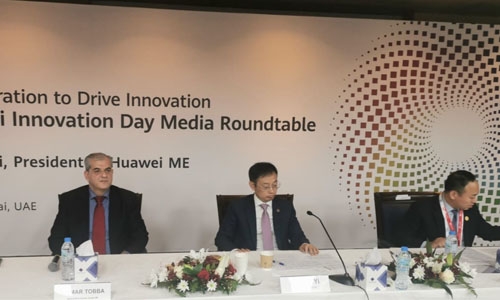Huawei to invest US$15 million in Middle East region
Agencies| Dubai
The Daily Tribune – www.newsofbahrain.com
Steven Yi, the President of Huawei Middle East, held a Huawei Innovation Day Media Roundtable discussion on “Collaboration to Drive Innovation” at GITEX Global 2021.
Below are the excerpts from the meeting held last week.
What are the plans and priorities of Huawei in Bahrain?
What’s new in cloud?
I’ve worked for a few years myself in Bahrain, so I know the country pretty well.
There is already full 5G coverage in Bahrain.
We must first of all ensure the stable operation of the network.
The next step is to grow the 5G application in various industries.
In the cloud domain, we plan to invest US$15 million to support ecosystem development, talent cultivation, and start-ups in the Middle East region. We will work with partners to put in more effort.
Our goal is to support all countries in the region in their intelligent upgrade and digital transformation.
That of course includes Bahrain.
We welcome Bahraini enterprises and talents to join Huawei’s ecosystem and contribute to Bahrain’s digital transformation and intelligent upgrade.
We know that Huawei has cooperation with the Bahrain government in the new airport project, which was completed at the beginning of this year.
Does Huawei have any new plans for the Bahrain market in smart cities?
That is based on the needs of local customers and partners.
We hope to apply our successful practice and experience in building smart cities to all aspects of Bahrain’s smart city construction, not just airports.
Can you share your thoughts on the 5G progress in the Middle East market?
5G deployment has been quite successful in the Middle East.
5G is the most important infrastructure for the digital future.
Once the penetration rate of 5G subscribers is high enough, there will be solid business returns.
If it exceeds the 20% threshold, 5G will enter a rapid growth.
Up to now, the number of 5G subscribers in GCC countries has reached 7 million.
It is estimated that this number will exceed 10 million by the end of this year, which is 2 million more than our forecast in April, and the 5G penetration rate will reach 20%.
Globally, 176 commercial 5G networks have been deployed.
In the Middle East, most GCC countries have made good progress. A key difference between 5G and 4G is that 5G matters particularly to industry development.
For example, in Oman SOHAR port, Huawei worked with customer Omantel and partner Hutchison and implemented 5G-based vehicle license plate recognition, container number recognition, and remote detection, which greatly improves efficiency.
In countries such as the UAE, Saudi Arabia, Kuwait, and Qatar, we are working on similar 5GtoB projects to help industries improve efficiency.
What are the positive or negative impacts of this epidemic on Huawei?
What’s Huawei’s strategy in the Middle East, and business targets in the short and long term?
In fact, the pandemic has accelerated digitalization globally.
People became more aware of the importance of digitalization and that brought many opportunities to the industry.
For example, online activities such as online healthcare, online education, online shopping, and online meetings have become the new normal.
Traffic is growing rapidly in the Middle East.
We hope to work with customers to build a partnership with a win-win mindset to jointly address the challenges of the pandemic.
At the same time, we will seize and create opportunities to achieve growth in the context of accelerated 5G deployment and digital transformation.
Huawei has witnessed the evolution of telecommunication industry over the past 20 years in the Middle East, from SMS, to multimedia messaging, video calls, and now 5G connectivity.
Since the pandemic, industry digitization and online business have gained strong momentum.
Huawei’s priority now in the region is to first of all ensure reliable network operation.
Secondly, we will work with industry partners to apply ICT technologies and expertise to the epidemic prevention and control.
Regarding cyber security, does Huawei face any cyber security challenges in the Middle East?
What are Huawei’s suggestions for cyber security in the Middle East?
Cybersecurity is a common challenge for the entire industry, for all companies and all countries. In the past 30 years, Huawei has not had any major incident related to cyber security.
In the Middle East, Huawei has never been questioned about cyber security.
Since 2004, Huawei has provided network assurance for the Hajj pilgrimage in Saudi Arabia with zero network failure or accident, keeping the network secure and stable.
Huawei’s network assurance mechanism has been tested also at the G20 Summit in Saudi Arabia, the G20 Summit in China in 2016, and the World Cup in Russia in 2018.
It’s been proven effective.
In the Middle East, we are working with local governments, industry organizations, universities, customers, and partners, discussing how to advance cyber security and build open, transparent, and secure networks.
We believe that these efforts will help our cybersecurity operations in the Middle East.
Related Posts

